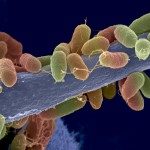Lien vers Pubmed [PMID] – 26980832
MBio 2016;7(2)
UNLABELLED: Chronic lung infections with opportunistic bacterial and fungal pathogens are a major cause of morbidity and mortality especially in patients with cystic fibrosis. Pseudomonas aeruginosa is the most frequently colonizing bacterium in these patients, and it is often found in association with the filamentous fungus Aspergillus fumigatus. P. aeruginosa is known to inhibit the growth of A. fumigatus in situations of direct contact, suggesting the existence of interspecies communication that may influence disease outcome. Our study shows that the lung pathogens P. aeruginosa and A. fumigatus can interact at a distance via volatile-mediated communication and expands our understanding of interspecific signaling in microbial communities.
IMPORTANCE: Microbiota studies have shown that pathogens cannot be studied individually anymore and that the establishment and progression of a specific disease are due not to a single microbial species but are the result of the activity of many species living together. To date, the interaction between members of the human microbiota has been analyzed in situations of direct contact or liquid-mediated contact between organisms. This study showed unexpectedly that human opportunistic pathogens can interact at a distance after sensing volatiles emitted by another microbial species. This finding will open a new research avenue for the understanding of microbial communities.

